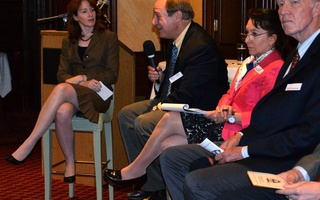
The Armed forces Alumni Association hosts the Annual Veterans Day Ball yesterday at the Business School. The ball honored veterans, alumni veterans and those currently serving.
Before coming to Harvard Business School, Christina D. Hruska flew Air Force reconnaissance missions over Iraq. Matthew A. Isenhower served as a force protection officer on a Navy destroyer. David C. Crabbe led Marine transportation units over explosive-lined roads in Anbar province. And Melissa A. Hammerle gathered tactical intelligence for the Army in Baghdad.
While many students enter Harvard Business School after jobs in large corporations, consulting, or finance, about 60 students—three percent of the school—come from careers in the military.
“We’re a tight knit group,” said Hruska, who is the chief financial officer of the Armed Forces Alumni Association, the main military organization on the HBS campus. “In this day and age where wars are part of the military experience, that ties us even closer together.”
LEARNING TO LEAD
After deployments to Iraq in 2005 and from 2006 to 2007, Crabbe began to consider what he wanted to do after leaving the Marine Corps. He had effectively been in the military since enrolling at the United States Naval Academy in 1999 and was looking for a change, he said.
After looking at several companies, his focus shifted to business school, Crabbe said. One executive and former military officer that he met recommended HBS. Crabbe said he realized the school was a good fit because, above all, it has a stated goal of educating leaders.
“People from the military have been shaped by different things,” said Deirdre C. Leopold, HBS managing director of MBA admissions and financial aid, in an April interview. “We like to consider ourselves a transformational experience. Some military people have already had one.”
While there is no preferential treatment of military applications, Leopold said, veterans tend to provide robust answers to questions about leadership.
In his first deployment to Iraq, Crabbe led a unit of 45 marines as a motor transportation platoon commander. At dark every other night, Crabbe’s unit would leave friendly lines in dozens of trucks laden with supplies, sometimes driving all night to reach their destination. The threat of roadside bombs, mortars, and sniper fire was constant, Crabbe said.
“You’re 23 years old and kind of thrown into the fire,” Crabbe said. “You have high stakes decisions, high stress, and not nearly as much information as you’d like. It’s something you have to do.”
A ‘STARK CONTRAST’
After flying missions across the world during seven years in the Air Force, Hruska decided to change careers. She spent a year doing engineering research before deciding to apply to business school. She said she was drawn to the supportive group of veterans at HBS.
In addition to herself, Hruska’s 90-person section has two other military veterans: a former Army Ranger and a former aide to General David H. Petraeus, commander of U.S. Central Command, according to Hruska. The other nine sections also have about three veterans each.
In class discussions, Hruska said, the military voices bring a unique perspective that students with different backgrounds appreciate.
“Everybody stops. You could hear a pin drop,” Hruska said of when her fellow veterans speak. “Their experiences are in stark contrast to what everyone else has done.”
Read more in News
Obesity Linked to Multiple SclerosisRecommended Articles
-
 Military Alumni Paid Tribute At Ceremony
Military Alumni Paid Tribute At Ceremony -
Continued Discrimination in ROTCThe recent repeal of the U.S. military’s Don’t Ask Don’t Tell (DADT) policy has paved the way for several universities, ...
-
Collateral DamageIn March of 2003, on the eve of the Iraq War, The Harvard Crimson found that only 34 percent of ...
-
 In Rapprochement, University Hosts Welcome Reception For Veterans
In Rapprochement, University Hosts Welcome Reception For Veterans -
Harvard Veterans Reflect on ServiceFor war veterans at Harvard commemorating Veterans Day on Friday, the occasion may hold special significance in a year marked by reconciliation between the University and the armed forces.
-
 Student Service Members Facilitate Conversations for Veterans
Student Service Members Facilitate Conversations for Veterans














